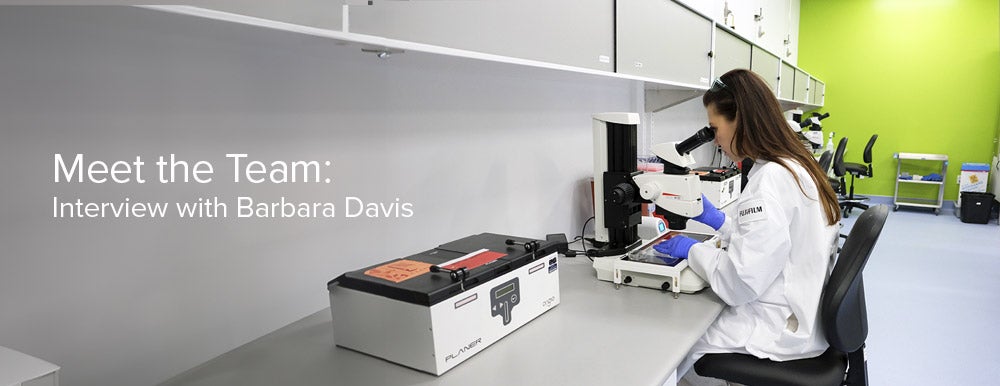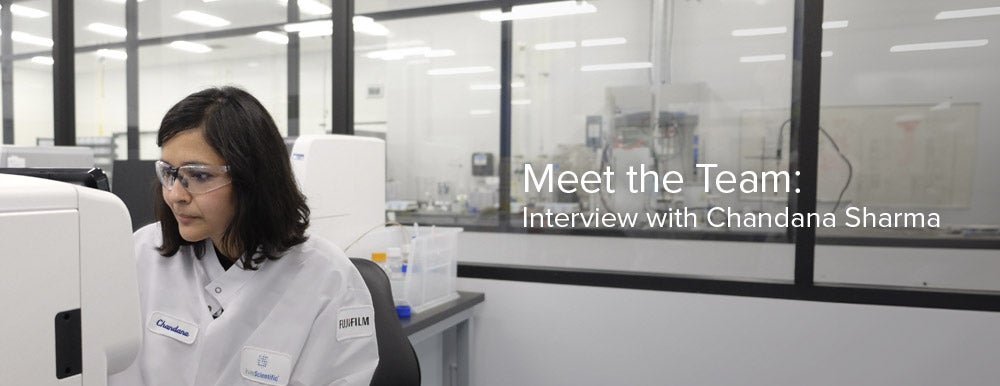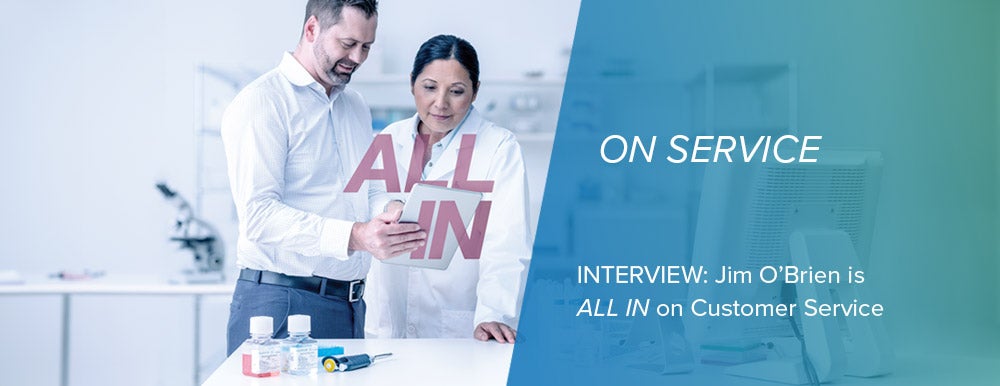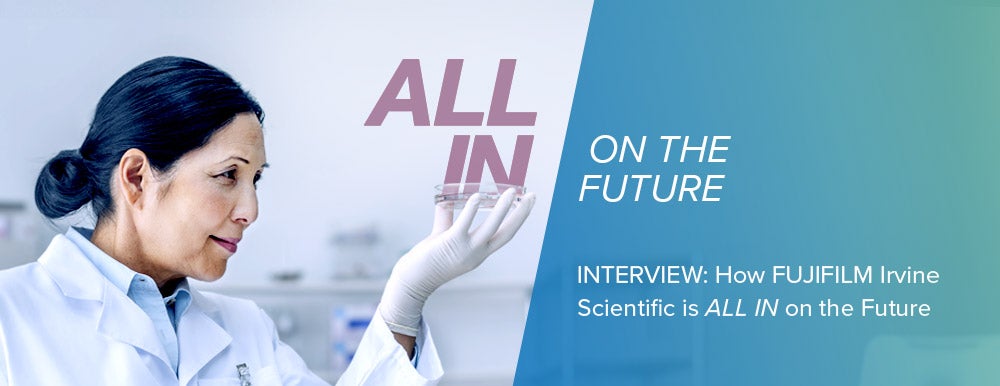We use cookies to make your experience better. To comply with the new e-Privacy directive, we need to ask for your consent to set the cookies. Learn more.
Meet the Team: Interview with Barbara Davis, R&D Manager, Assisted Reproductive Technology


For over 50 years, FUJIFILM Irvine Scientific has been dedicated to providing pioneering cell culture media products and services for the Life Science and Medical markets. As such, we have built an excellent team with a mission to empower customers to reach their goals, combining specialist knowledge and experience with a thorough understanding of the latest scientific data, typical workflows, and regulatory demands.
On the 11th February 2024, we celebrate International Day of Women and Girls in Science. At FUJIFILM Irvine Scientific, we are incredibly proud to have a diverse team of women contributing to research that supports innovation for a healthier world.
We have been speaking with members of our team and learning more about what drives them as part of our company’s commitment to Quality, Innovation, and Service. To align with International Day of Women and Girls in Science, we spoke to Barbara Davis, our R&D Manager within the Assisted Reproductive Technology (ART) team, to learn more about her passion for this field, her career as a successful female leader, and advice for others looking to join this transformative research space.
What is your role at FUJIFILM Irvine Scientific and when did you join the Company?
I joined FUJIFILM Irvine Scientific five years ago, directly out of Graduate School, as a Senior Scientist I. I am now the R&D manager for ART, Assisted Reproductive Technology, which is part of the Company’s Medical Business Unit. As a manager, I mentor and oversee a team of scientists whose primary goal is to innovate and develop new products that can help infertile couples achieve their goal of having a baby. We get to help make babies - it's awesome!
I feel like I have a very interesting, hybrid-type of a role as I still haven't quite let go of the lab, so I try to get in there as much as I can but quite honestly, it doesn't happen as often as I'd like. I would say the majority of my day is spent supporting my team; helping them manage and oversee their projects, making sure that everyone is staying on track, and that tasks are staying within budget and on time. I also help groups outside of R&D by giving support and scientific advice. A lot of my time is spent keeping up-to-date with our field within the market, trying to develop potential strategies and innovate new products.
What attracted you to FUJIFILM Irvine Scientific and, specifically, the Assisted Reproductive Technology (ART) industry?
I've always had a passion for reproductive biology. When I was in college, my goal was to go to Med school and become an OBGYN, but I ended up pivoting and completing my PhD instead. So, going into a reproductive-associated field obviously aligned with my passion. Joining the FUJIFILM Irvine Scientific team was more of a fortuitous thing that happened to me – the former postdoc of my graduate lab had gotten a job here previously, so when I was graduating, she recruited me to the Company. It aligned with my passion, and it was perfect. Everything worked out really well.
What is your professional and academic background that has led you to this role?
In my former life, when I was in academia, I was predominantly a stem cell biologist working in reproductive toxicology. More specifically, the lab that I was in was looking at the adverse health effects of electronic cigarettes. This was when they were very new, and when they first started coming to market. At this time, people were being advised that they were safe and that you could even use them while you were pregnant. As part of our work, we were using stem cells as an embryonic model of development, essentially dosing them with the vapour from electronic cigarettes and showing the adverse effects on their differentiation into particular cell lines. My work focused on neural differentiation because the nervous system is the most sensitive throughout the entirety of development, so it's a really good model system. We also did a little bit of side work working with induced pluripotent stem cells derived from Huntington's disease patients, and we were looking at some 'disease-in-a-dish models' to try to address the condition.
What do you enjoy most about working for FUJIFILM Irvine Scientific, and how do you think it differs from other employers?
There’s a couple of reasons why I really love working here. Obviously, the first is because I love reproductive biology, and that what we do here is helping people fulfil their goal of having a family. Everyone really understands the importance of their contribution to what we do, not just on the ART side, but also on our cell therapy and bioproduction teams too. A lot of us work cross functionally and are really a close-knit team.
I really love our corporate culture - the environment and the people here. Everyone at this company is so nice, so kind and helpful. I know it sounds cliché, but we are like a family – especially here in R&D.
I feel so blessed, the team and what we’re working towards really motivates me – I really enjoy being here and enjoy the people that I work with, it makes my long Southern California commute worth it. Even though I love what I do, if I didn’t love doing it with the people that I’m surrounded by, I don’t think I’d be here.
Having built a successful career as a leader within the industry, do you have any tips or advice for other women pursuing a career in R&D? Do you have any words of wisdom for the next generation of science professionals?
I had to think hard about this one, what would I tell others... I would say, be honest, be genuine and don't be afraid to be yourself. Not to generalize, but I feel people, particularly women, feel like they have to be very strong and assertive all the time or they're afraid to speak up. You don’t have to be either of those things – you can be you, whomever you are, as long as you’re genuine and transparent. You don’t have to assume a role that you’re not comfortable with. If you show up every day, do your job, do it well (give 100%), and if you are respectful to people, people will be respectful to you, and your contributions will be noted and seen.
You don’t have to feel like you have to fit into a box.
What does your team focus on at FUJIFILM Irvine Scientific?
On my team, there are five wonderful, amazing scientists; four are in a group that we call new product development – pretty self-explanatory. They are working on innovation and developing products that are going to go to market. In addition, I have another scientist who leads the scientific support team for ART. This group primarily focuses on supporting other FISI departments (working cross-functionally). One group in particular that we work with very closely is our Regulatory Affairs team. ART products are considered medical devices, so we go through a very lengthy regulatory process and work very closely with our regulatory affairs team to help them with the scientific aspects of regulatory filings. Also, if they get queries back from the regulatory bodies that require scientific justifications, we help address those.
FUJIFILM Irvine Scientific provides a range of ART products to best meet customers’ needs in this industry, how are the Company’s solutions helping to tackle the challenges seen across IVF?
FUJIFILM Irvine Scientific has always been an industry leader in the ART field. We're always trying to bring innovation, and not just in our products. Paramount to everything is quality. Everyone here is very keenly aware of the importance of what we do, and the impact our products have on peoples' lives. Every single one of us takes this responsibility very seriously and we all work very diligently to make sure that any product that we develop is of the highest calibre and it's going to bring benefit.
In terms of the field, we want to understand the market and the market need, not just the need today, but where the market is going in the future. Where is the market going, what are the needs or the changes that we foresee happening, and how can we address that? Both on the patient side, and for the clinician.
For example, the number of patients going through ART procedures has increased. Infertility rates are increasing for both men and women, and with technologies like the internet, people have more accessibility to information and are more knowledgeable. This is making it harder for labs to keep up with demand. In response, we're always trying to think of ways to bring benefit or improve not just our products, but methodologies – can we bring in or create other technologies that will help make the laboratory workflows more efficient? That way we can support clinicians so they’re better able to help more patients.
How important do you think new technology will be to the ART industry?
If we can harness the power of technology like AI, neural networks, and machine learning, we can use it to improve patient outcomes and clinical workflows – I think that is wonderful. Technology is always advancing and this is the direction society is going. That we can potentially be at the forefront of something new to help clinicians achieve better results for patients is amazing.
We’re constantly thinking about where the market and society at large is going, or where we’re going to see a gap. Keep an eye out for more developments in this space – there is many exciting advances to come.
Stay tuned to meet more of our team! Please subscribe to our mailing list and follow us on LinkedIn.






